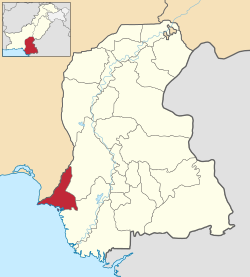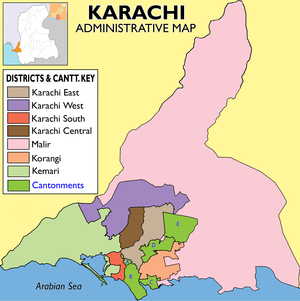Karachi Division
Karachi Division
کراچی ڈویژن | |
|---|---|
 | |
| Coordinates: 24°54′21″N 67°04′50″E / 24.9059°N 67.0805°E | |
| Country | |
| Province | |
| Capital | Karachi |
| Established | 1960 |
| Districts | 7 |
| Government | |
| • Type | Divisional Administration |
| • Commissioner | Iqbal Memon[1] |
| • Regional Police Officer | N/A |
| Population (2017)[2] | |
| • Total | 16,051,521 |
| combined population of all districts | |
| Time zone | UTC+5 (PST) |
| Postal code | 74XXX – 75XXX |
| Dialling code | 021 |
Karachi Division (Urdu: کراچی ڈویژن ) is an administrative division of the Sindh Province of Pakistan. There are seven districts of Karachi Division. CNIC code of Karachi Division is 42.[3][4]
History
In December 1960 Lasbela became a separate district from Kalat division and was placed to form Karachi-Bela division.
In 1972, Lasbela district transferred back to Kalat division and Karachi district divided into three (03) districts; East, West and South.
In 1996, Two (02) more districts Central and Malir was created in Karachi division.
The Karachi Division was abolished in 2001 and five districts of Karachi were merged in City District Karachi. The City District Karachi was divided in 18 Towns and 178 union councils.[5] Commissioner Karachi division was made DCO City District government Karachi.
On 11 July 2011, Sindh Government restored 5 districts of Karachi division.[6]
In November 2013, a new district (sixth), Korangi was formed by splitting District Karachi East.[7][8]
In August 2020, Sindh cabinet approved formation of the seventh district in Karachi - Keamari District. Keamari District was formed by splitting District West.[3][4]
Recently, Sindh Government renamed the four existing Districts to their famous areas names.
| Old Names | New Names |
|---|---|
| Karachi South District | Karachi District |
| Karachi Central District | Nazimabad District |
| Karachi East District | Gulshan District |
| Karachi West District | Orangi District |
Currently, Sindh government is planning to create Bin Qasim district after bifurcating Malir district.
Districts of Karachi Division

There are seven districts of Karachi, namely:
- Nazimabad District (officially renamed)[9]
- Gulshan District (officially renamed)[9]
- Karachi District (officially renamed)[9]
- Orangi District (officially renamed)[9]
- Korangi District
- Malir District
- Keamari District
CNIC Codes
- Nazimabad District 42301
- Gulshan District 42201
- Karachi District 42101
- Orangi District 42401
- Korangi District same as Gulshan District
- Malir District 42501
- Keamari District same as Orangi District
References
- ^ "Commissioner Karachi Winter Basketball Coaching Camp starts". The Nation (newspaper). 30 December 2021. Retrieved 5 January 2022.
- ^ "DISTRICT WISE CENSUS RESULTS CENSUS 2017" (PDF). www.pbscensus.gov.pk. Archived from the original (PDF) on 29 August 2017. Retrieved 3 September 2017.
- ^ a b "New district in Karachi". Dawn. Pakistan. 22 August 2020. Retrieved 1 September 2020.
- ^ a b Karachi fits seventh district into its mix – Keamari
- ^ City District Government Karachi Archived 15 October 2013 at the Wayback Machine Official Website
- ^ Five districts of Karachi restored, Published in The News International on 11 July 2011, Retrieved on 5 August 2012
- ^ dawn.com, Korangi notified as sixth district of Karachi
- ^ The News, Korangi made sixth district of Karachi
- ^ a b c d "Four Karachi districts to be renamed". 29 March 2024. Retrieved 4 April 2024.
- Pages using gadget WikiMiniAtlas
- Webarchive template wayback links
- Use Pakistani English from September 2020
- All Wikipedia articles written in Pakistani English
- Use dmy dates from November 2022
- Articles with short description
- Short description is different from Wikidata
- Coordinates on Wikidata
- Articles containing Urdu-language text
- Government of Karachi
- Divisions of Sindh
- Countries and territories where Urdu is an official language
- All stub articles
- Sindh geography stubs